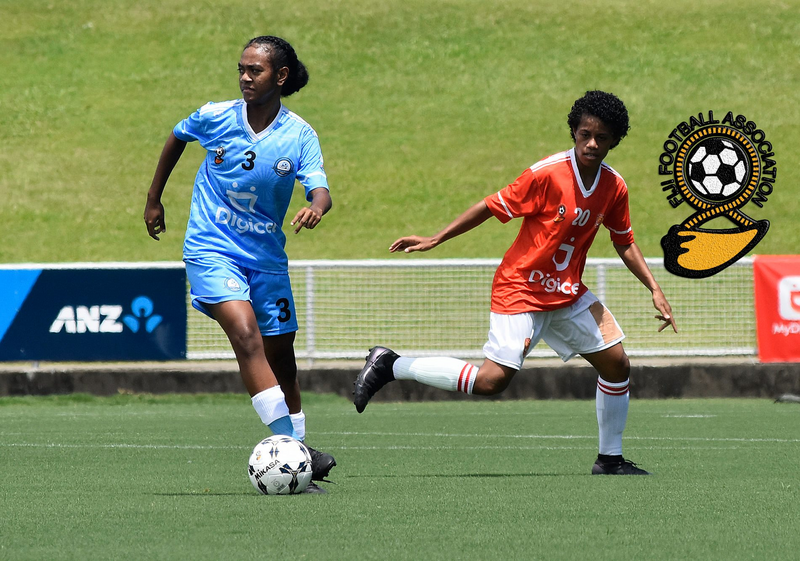Fiji begins new national women’s league this weekend
National team reached new heights during France 2019 qualifying
FIFA-supported league a boost for national team ahead of 2023 qualifiers
For many, Fiji conjures soothing images of palm trees, golden beaches and idyllic warm waters. That tropical paradise can indeed be found, but the Melanesian nation has also boasts a surprisingly strong football and sporting culture.
Fiji was undoubtedly a footballing pioneer among island nations in the Pacific. The Melanesians were, by some margin, the first Pacific side to compete in Oceania FIFA World Cup™ qualifiers alongside Australia and New Zealand. Their astounding 1988 World Cup win over a strong Socceroos side on a frog-infested Prince Charles Park in Nadi still resonates among the local sporting fraternity.
But now the platform for a new chapter in Fijian football is being put in place, and the early signs are very encouraging. Women’s football enjoyed a landmark moment this weekend with the opening of the six-team FIFA-funded national Women’s Super League competition. FIFA’s involvement also includes provision of support equipment, funding and capacity building for coaches, with a women's football grant also recently approved.

The flurry of activity is yet another gauge of the spin-off benefits after last year’s announcement that the 2023 FIFA Women’s World Cup™ will take place in the region. OFC are guaranteed one spot in the new global play-off event to be held just prior to the Australia/New Zealand-based tournament.
Two years ago, Fiji timely broke new ground in Women’s World Cup qualifying by reaching the continental decider against New Zealand. Papua New Guinea’s long held reign in the Pacific had seemed unbreakable until the Fijians stepped up in late 2018.
Now, with 2023 qualifiers scheduled for next year, national coach Marika Rodu is heavily invested in the new competition. “The objective is to see all the teams adopt the same playing philosophy so the fans can enjoy watching them,” said Rodu.
“This give us opportunities to see the weakness in the teams and players which we will give feedback to the coaches and that is how we going to see the best in the competition. At the end the players will be developed and exposed playing in the competition, which will boost the performance of the national team as well.”

Shazia Usman from the UN Women Fiji Multi-Country Office (pictured above right), who was the primary guest at the season launch, told FIFA.com that visible role models for women are critical. “Like any profession or area in life, women and girls must be given opportunities to participate on equal footing with men and boys to progress, and to make the sporting field equal for all,” she said.
“While representation of women athletes in media is important for girls, so is the investment in women and girls sports development – from training programmes in schools to national and international level participation, to safeguarding policies, to equal pay, and to the employment of women officials. A ‘whole of’ approach in sports is needed.
“While women and girls in Fiji and the Pacific do play sports, they are largely dissuaded from pursuing it as a career and face a lot of barriers, even violence, when they choose to do so. Even young girls are discouraged from playing outside due to immense societal pressure where they are expected to confirm to gender norms, which is ‘girls stay in the house and help out, and boys work and play outside’.
“And lastly, as I recently said to the women players in attendance at the Fiji Football Association’s Women’s Super League launch: ‘Claim your space in sports. Sports belongs to you and you belong in the sport. It does not just belong to men and boys. And I cannot wait to see you in action in the Women’s Super League’.”
Fiji FA board member and FIFA Women in Football Leadership Program participant, Naziah Ali says it is timely to provide further impetus two years out from the 2023 Women’s World Cup. “Since the last Women’s World Cup in France, the world now sees women’s football in a more positive light and we plan to take advantage of this positive momentum when it comes in our region,” she told FIFA.com.
“We not only have an opportunity to qualify for the play-off but we also have a lot to gain when the world turns their eyes on the Pacific. As a region with a small women’s football footprint compared to Europe and the Americas, with the increased media attention and hype, we hope that we can inspire more women and girls to participate, as well as attract more sponsors to invest in the sport.”
Ali says the Fiji FA has just approved a strategic plan which has a huge focus on the development of women’s football. “Finance is huge for the growth of women’s football and we would like to see that we improve the game, the teams, players, coaches and administrators in the future,” she said.
“We’ve come a long way since we started in the early 90s. From being unranked a couple of years back to being 65th on the FIFA Women’s Ranking is a good start for a small nation like ours and we are ambitious in our prospect to qualify for the upcoming Women’s World Cup, or the next one.
“We hope that young Fijian girls will follow the Women’s World Cup journey and be inspired to be future footballers.”
This article is part of our series focused on women’s football, and women in football, to celebrate International Women’s Day 2021. To find out more about FIFA’s Women’s Football Strategy and Development Programmes, and to read more articles like this, click here.